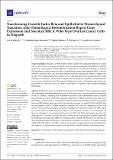Transforming Growth Factor Beta and Epithelial to Mesenchymal Transition Alter Homologous Recombination Repair Gene Expression and Sensitize BRCA Wild-Type Ovarian Cancer Cells to Olaparib
Author(s)
Roberts, Cai M.; Rojas-Alexandre, Mehida; Hanna, Ruth E.; Lin, Z. Ping; Ratner, Elena S.
Downloadcancers-15-03919-v2.pdf (3.522Mb)
Publisher with Creative Commons License
Publisher with Creative Commons License
Creative Commons Attribution
Terms of use
Metadata
Show full item recordAbstract
Simple Summary
Olaparib is a PARP inhibitor that is currently the standard treatment for ovarian cancer. However, its use is largely confined to tumors carrying a mutation in the BRCA1 or BRCA2 genes. Our study sought to identify additional ovarian cancer cell populations sensitive to olaparib. TGFβ has been well characterized as a driver of epithelial to mesenchymal transition (EMT), a process whereby epithelial cancer cells alter their adhesion molecules and gain the ability to migrate and invade. We hypothesized that the cytokine TGFβ would alter DNA repair mechanisms that render wild-type ovarian cancer cells sensitive to olaparib. We used two pairs of epithelial and mesenchymal ovarian cancer cell lines to probe DNA repair and olaparib response. Our findings suggest that some populations of metastatic cancer cells may be vulnerable to olaparib or other therapies targeting DNA repair.
Abstract
Epithelial ovarian cancer (EOC) remains the most lethal gynecologic malignancy, largely due to metastasis and drug resistant recurrences. Fifteen percent of ovarian tumors carry mutations in BRCA1 or BRCA2, rendering them vulnerable to treatment with PARP inhibitors such as olaparib. Recent studies have shown that TGFβ can induce “BRCAness” in BRCA wild-type cancer cells. Given that TGFβ is a known driver of epithelial to mesenchymal transition (EMT), and the connection between EMT and metastatic spread in EOC and other cancers, we asked if TGFβ and EMT alter the susceptibility of EOC to PARP inhibition. Epithelial EOC cells were transiently treated with soluble TGFβ, and their clonogenic potential, expression, and function of EMT and DNA repair genes, and response to PARP inhibitors compared with untreated controls. A second epithelial cell line was compared to its mesenchymal derivative for EMT and DNA repair gene expression and drug responses. We found that TGFβ and EMT resulted in the downregulation of genes responsible for homologous recombination (HR) and sensitized cells to olaparib. HR efficiency was reduced in a dose-dependent manner. Furthermore, mesenchymal cells displayed sensitivity to olaparib, cisplatin, and the DNA-PK inhibitor Nu-7441. Therefore, the treatment of disseminated, mesenchymal tumors may represent an opportunity to expand the clinical utility of PARP inhibitors and similar agents.
Date issued
2023-08-01Department
Massachusetts Institute of Technology. Department of BiologyJournal
Cancers
Publisher
Multidisciplinary Digital Publishing Institute
Citation
Roberts, C.M.; Rojas-Alexandre, M.; Hanna, R.E.; Lin, Z.P.; Ratner, E.S. Transforming Growth Factor Beta and Epithelial to Mesenchymal Transition Alter Homologous Recombination Repair Gene Expression and Sensitize BRCA Wild-Type Ovarian Cancer Cells to Olaparib. Cancers 2023, 15, 3919.
Version: Final published version